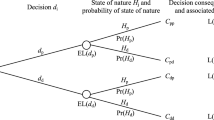Abstract
The Cohenian paradox is one of the main themes of judicial probability theory and one of the core topics discussed by the new evidence scholarship. To resolve this paradox, evidence scholars nowadays have proposed various solutions, including legal probabilism, Bayesian decision theory, and relative plausibility theory. These three solutions can be classified into two approaches, i.e., the probabilism and the explanationism. Among them, the former includes legal probabilism and Bayesian decision theory, and the latter includes the relative plausibility theory. However, the two approaches have recently begun to converge and become more understandable to each other. For example, Welch (2020) has recently defended and improved the relative plausibility theory by substantially improving it with the help of Bayesian decision theory. In this paper, by contrast, we attempt to defend the probabilistic approach - legal probabilism and Bayesian decision theory on the basis of relative plausibility theory.
Access this chapter
Tax calculation will be finalised at checkout
Purchases are for personal use only
Similar content being viewed by others
Notes
- 1.
United States v. Shonubi, 895 F. Supp. 460 (E.D.N.Y. 1995).
- 2.
United States v. Shonubi, 103 F.3d 1085 (2d Cir. 1997).
References
Allen, R.J.: The nature of juridical proof: probability as a tool in plausible reasoning. Int. J. Evid. Proof 21(1–2), 133–142 (2017). https://doi.org/10.1177/1365712716674794
Allen, R.J., Pardo, M.S.: The problematic value of mathematical models of evidence. J. Legal Stud. 36(1), 107–140 (2007)
Allen, R.J., Pardo, M.S.: Relative plausibility and its critics. Int. J. Evid. Proof 23(1–2), 5–59 (2019). https://doi.org/10.1177/1365712718813781
Cohen, L.J.: The Probable and the Provable. Clarendon Press, Oxford (1977)
Colyvan, M., Regan, H.M., Ferson, S.: Is it a crime to belong to a reference class. J. Polit. Philos. 9(2), 168–181 (2001). https://doi.org/10.1111/1467-9760.00123
Colyvan, M., Regan, H.M.: Legal decisions and the reference class problem. Int. J. Evid. Proof 11(4), 274–286 (2007). https://doi.org/10.1350/ijep.2007.11.4.274
Dawid, A.P.: The difficulty about conjunction. J. R. Stat. Soc. Ser. D (Stat.) 36(2/3), 91–97 (1987)
Franklin, J.: The objective Bayesian conceptualisation of proof and reference class problems. Sydney Law Rev. 33(3), 545–561 (2011)
Friedman, R.D.: Answering the Bayesioskeptical challenge. Int. J. Evid. Proof 3(4), 276–291 (1997)
Hájek, A.: Explanations of probability. The Stanford Encyclopedia of Philosophy. Substantive revision 2019. Stanford Encyclopedia of Philosophy (2019). https://plato.stanford.edu/archives/fall2019/entries/probability-interpret/
Hamer, D.: Probabilistic standards of proof, their complements and the errors that are expected to flow from them. Univ. New Engl. Law J. 1(1), 71–107 (2004)
Horwich, P.: Wittgensteinian bayesianism. Midwest Stud. Philos. 18(1), 62–77 (1993)
Hunt, I., Mostyn, J.: Probability reasoning in judicial fact-finding. Int. J. Evid. Proof 24(1), 75–94 (2020). https://doi.org/10.1177/1365712719875753
Kaplan, J.: Decision theory and the fact-finding process. Stanford Law Rev. 20(6), 1065–1092 (1968)
Lipton, P.: Inference to the Best Explanation, 2nd edn. Routledge, Abingdon (2003)
Pardo, M.S.: The paradoxes of legal proof: a critical guide. Boston Univ. Law Rev. 99(1), 233–290 (2019)
Pardo, M.S., Allen, R.J.: Juridical proof and the best explanation. Law Philos. 27(3), 223–268 (2008). https://doi.org/10.1007/s10982-007-9016-4
Redmayne, M.: Exploring the proof paradoxes. Legal Theory 14(4), 281–309 (2008). https://doi.org/10.1017/S1352325208080117
Rescher, N.: Dialectics: A Controversy-Oriented Approach to the Theory of Knowledge. State University of New York Press (1977)
Simon, D.: Thin empirics. Int. J. Evid. Proof 23(1–2), 82–89 (2019). https://doi.org/10.1177/1365712718815350
Taroni, F., Aitken, C., Garbolino, P., Biedermann, A.: Bayesian Networks and Probabilistic Inference in Forensic Science. Wiley, New York (2006)
Urbaniak, R., Di Bello, M.: Legal Probabilism. Stanford Encyclopedia of Philosophy. First publshied 8 June 2021 (2021). https://plato.stanford.edu/archives/sum2021/entries/legal-probabilism/
Welch, J.R.: Rebooting the new evidence scholarship. Int. J. Evid. Proof 24(4), 351–373 (2020). https://doi.org/10.1177/1365712720943329
Acknowledgments
This work was supported by the National Office and Social Science, P. R. China, for the project “Logical Model of Criminal Evidential Reasoning” (19BZX138).
Author information
Authors and Affiliations
Corresponding author
Editor information
Editors and Affiliations
Rights and permissions
Copyright information
© 2021 Springer Nature Switzerland AG
About this paper
Cite this paper
Du, W., Niu, Z., Xiong, M. (2021). Resolving the Cohenian Paradox in Judicial Probability Theory. In: Baroni, P., Benzmüller, C., Wáng, Y.N. (eds) Logic and Argumentation. CLAR 2021. Lecture Notes in Computer Science(), vol 13040. Springer, Cham. https://doi.org/10.1007/978-3-030-89391-0_1
Download citation
DOI: https://doi.org/10.1007/978-3-030-89391-0_1
Published:
Publisher Name: Springer, Cham
Print ISBN: 978-3-030-89390-3
Online ISBN: 978-3-030-89391-0
eBook Packages: Computer ScienceComputer Science (R0)




